2001 Toyota Camry Repair, Service & Tires
Get Started
Complete Auto Care for Your 2001 Toyota Camry
-
TIRES FOR YOUR 2001 Toyota Camry View Tire Info GET TIRE PRICING
-
REPAIR FOR YOUR 2001 Toyota Camry View Repair Info SCHEDULE REPAIR
-
MAINTENANCE FOR YOUR 2001 Toyota Camry View Maintenance Info SCHEDULE MAINTENANCE
-
OFFERS FOR YOUR 2001 Toyota Camry Limited Time Tire Offers VIEW ALL COUPONS
2001 Toyota Camry Tires
Recommended Tires | Tire Information
2001 Toyota Camry Tires Sizes, Speed Ratings, and Inflation
Not sure about your 2001 Toyota Camry tire size? Use the following chart to find information on tire size, speed rating, and inflation.
| Trim Level | Speed Rating | Inflation in PSI F/R | Tire Size |
|---|---|---|---|
| 2001 Toyota Camry LE | H | 32 PSI/32 PSI | P205/65R15 |
| 2001 Toyota Camry XLE* | H | 32 PSI/32 PSI | P205/60R16 |
| 2001 Toyota Camry XLE* | H | 32 PSI/32 PSI | P205/65R15 |
| 2001 Toyota Camry CE | H | 32 PSI/32 PSI | P205/65R15 |
|
2001 Toyota Camry LE Speed Rating: H Inflation F/R: 32 PSI/32 PSI |
|
2001 Toyota Camry XLE* Speed Rating: H Inflation F/R: 32 PSI/32 PSI |
|
2001 Toyota Camry XLE* Speed Rating: H Inflation F/R: 32 PSI/32 PSI |
|
2001 Toyota Camry CE Speed Rating: H Inflation F/R: 32 PSI/32 PSI |
* Note: these models have different tire sizes depending on vehicle options.
Recommended Tires for Your 2001 Toyota Camry
What tires are best for a 2001 Toyota Camry? Check out the following tire brands and types.
 Blizzak WS90
Blizzak WS90
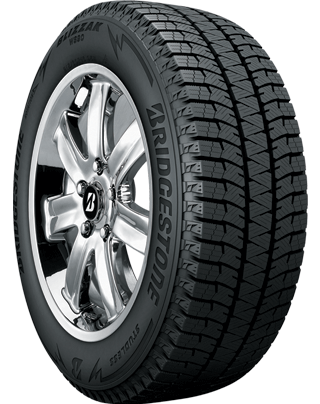
- No warranty
- Winter
- Winter
 Ecopia EP422 Plus
Ecopia EP422 Plus
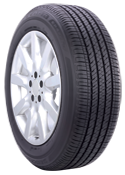
- Platinum Pact Limited Warranty
- All-Season
- Performance
 Turanza QUIETTRACK
Turanza QUIETTRACK
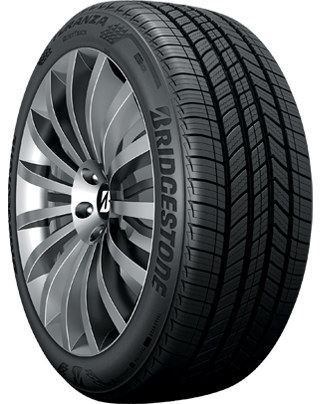
- No warranty
- All-Season
- Performance
 Turanza T005
Turanza T005
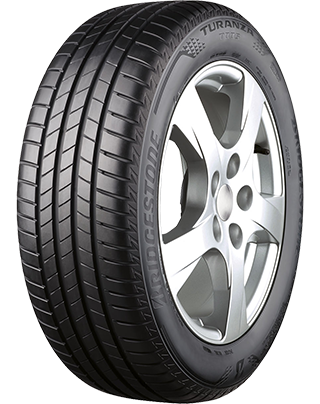
- No warranty
- Summer
- Performance
 WEATHERPEAK
WEATHERPEAK
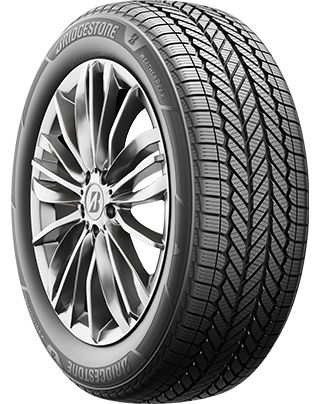
- Platinum Pact Limited Warranty
- All-Season
- Passenger Tires
 ALL SEASON
ALL SEASON

- No warranty
- All-Season
- Passenger Tires
 WEATHERGRIP
WEATHERGRIP
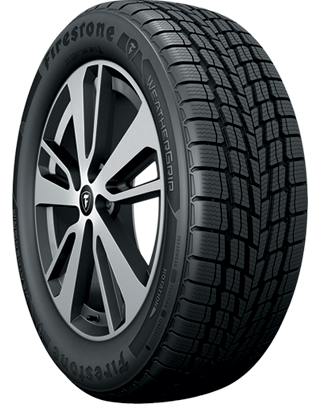
- No warranty
- All-Season
- Passenger Tires
 FT140
FT140
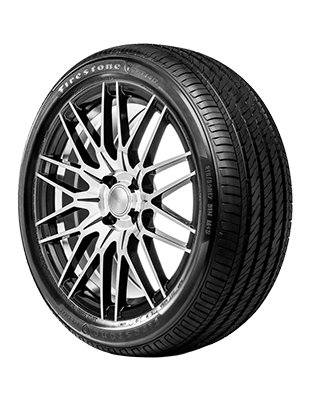
- No warranty
- All-Season
- Passenger Tires
 Winterforce 2
Winterforce 2
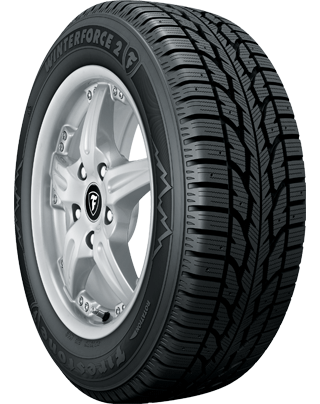
- No warranty
- Winter
- Winter

- No warranty
- All-Season
- Passenger Tires

- No warranty
- All-Season
- Passenger Tires
 Extensa A/S II
Extensa A/S II

- No warranty
- All-Season
- Passenger Tires
2001 Toyota Camry Tire Information
Beyond the correct tire size, you also want to think about a couple of other things when getting new Toyota Camry tires like which tire brands you like most and where you drive. When thinking about your driving conditions, consider where you live (mountains vs. city vs. countryside) and the kind of weather can catch you off-guard. (Watch out Tornado Alley!) Many drivers who live in states that experience all four seasons choose to purchase two sets of tires: one set for winter, one set for summer. Other drivers buy one set of all-season tires instead. That way they don't have to return to the tire shop and their vehicle is always ready for sun, rain, and light snow!
Your personal driving style is the next factor to consider. If you're an avid off-roader who yearns to pioneer new paths, you have very different tire needs than a highway commuter who doesn't hit the hills very often. Talk to a tire technician at Firestone Complete Auto Care for help choosing the best tire for you, or start shopping for Toyota Camry tires online.
Installing Toyota Camry Tires
We sell tires, but we also service them and care for all the around-the-wheel components. We're a tire store that also offers professional tire installation, maintenance, and rotation, along with complete auto care. Shop 2001 Toyota Camry tires online and schedule an installation appointment.
2001 Toyota Camry Tire Questions
-
Why check Toyota tire inflation? Even a tiny decrease in tire pressure could impact your safety and fuel economy. Maintaining proper tire pressure can help increase fuel economy, improve braking time, and boost tire lifespan.
-
What do the tire sidewall numbers mean for my Toyota Camry? Your tire sidewall gives you information about load carrying capacity, speed rating, treadwear, traction, and tire size. Talk to one of our tire technicians to learn how to read the numbers on your tire!
-
Is there an easy way to check Toyota tire tread depth? Stay on top of your tire tread depth to help avoid a dangerous drive. You can check tread depth with a penny. Hold the penny so that Abraham Lincoln is facing you, then place your penny into a tread groove upside down. If you can see the top of Abe’s head, your tread is shallow and it might be time for new Toyota Camry tires. Grab a penny. Hold the so that Abe Lincon's head is facing you and his hair is pointing toward the ground. Then, place the penny into a tread groove. If you can see the top of Abe’s head, your tread is shallow and it might be time for new Toyota Camry tires.
Types of 2001 Toyota Camry Repairs
How do I learn more about auto repairs? Click on a service below to read about the types of Toyota Camry repairs we do at Firestone Complete Auto Care.
Get Repairs for Your 2001 Toyota Camry
For most drivers, the words “car repair” don’t exactly spark excitement. But we work to provide you with a different experience at Firestone Complete Auto Care. When it’s time for 2001 Toyota Camry repair services, head to your nearest Firestone location and rest easy knowing that your Camry is in capable hands. We’ll start by assessing what repairs may be needed, and we’ll provide you with a detailed explanation of what we recommend. We value your trust, so we recommend only the repairs we think are necessary for your safety on the road.
What Will Toyota Camry Repairs Cost?
Several factors can affect the cost to repair your 2001 Toyota Camry, including what kind of repair you need, prices of appropriate replacement parts, the amount of labor necessary to get the job done, and the state you live in. But regardless of where you’re located, check out our website for repair coupons and offers that could save you some cash.
A few different aspects can influence repair costs for your 2001 Toyota Camry, like
2001 Toyota Camry Auto Repair Questions
-
Do I still need scheduled maintenance even when nothing is wrong with my Toyota? The cheapest 2001 Toyota Camry repair is the one that isn’t necessary in the first place! Staying up-to-date with your car’s scheduled maintenance services is a great way to keep future repair costs low.
-
What's wrong if something feels 'off' in my Toyota? You’re in your car, day in and day out. So, it’s only expected that you know your car better than anyone else! If you notice mysterious smells, strange engine noises, or other out-of-the-ordinary symptoms while driving, trust your instincts and stop into Firestone Complete Auto Care for a Courtesy Check. Catching a potential issue early could help prevent Toyota Camry repairs.
-
Are the repairs you recommend for my Toyota actually needed? Trust is more than just a saying on the wall. It’s a window underneath it. That’s why we won’t recommend services or repairs for your 2001 Toyota Camry unless we think they’re vital to your safety on the road.
Get Your 2001 Toyota Camry Brakes Fixed
Your Toyota Camry engine may be strong and reliable. But if you can't stop it, then it's scrap metal. If you notice your brakes are squeaking or not working well, don’t wait! Safe driving is difficult when your brakes are anything but their best. Plus, ignoring your brake problems can result in more damage and higher brake repair bills. Visit Firestone Complete Auto Care for the right brake repair for your 2001 Toyota Camry. We offer a variety of brake services like brake pad/shoe replacement, brake rotor/drum machining, brake fluid exchange, and brake caliper and wheel cylinder service.
Answers to Your Camry Brakes Questions
-
Why is my Camry shaking as I brake? If your Camry shakes when you brake, you could be dealing with warped rotors, faulty brake calipers, worn brake pads or rotors, or loose or worn suspension parts. Schedule a free brake inspection at Firestone Complete Auto Care for help diagnosing your brake issue.
-
What is the average lifespan of Camry brake pads? In general, brake pads can last from 30,000 to 40,000 miles. Certain factors, like driving on highways mostly and braking smoothly, can help your brake pads last longer. Hauling heavy loads and riding your brakes can shorten brake pad lifespan.
-
Can brake fluid leak when my Camry is off? Because your Camry brake system is a closed hydraulic system, it should not leak brake fluid. However, if components in your brake system have worn out or been damaged, it might cause brake fluid to leak.
When to Get Toyota Camry Drivetrain Repairs
Drivetrains for front, rear, and all-wheel-drive and 4WD vehicles are quite different, so you don't want to go to just anyone for drivetrain repair. You want to visit Firestone Complete Auto Care. We can take care of most 2001 Toyota Camry drivetrain components Your Toyota Camry may need driveshaft attention if you feel vibration as your vehicle accelerates, clunks when shifting, heavy vibrations in your floorboards, or resistance when turning.
2001 Toyota Camry Drivetrain Q&A
-
What are signs my Toyota drivetrain is damaged? Noises toward the back of your Toyota Camry, leaking fluid, trouble turning — these could all be signs of drivetrain damage you want to address. Take action before something more severe happens.
-
What triggers the malfunction indicator light (MIL) in a Camry? A multitude of problems can activate your Camry’s malfunction indicator light (better known as the check engine light), including issues with the engine, transmission, sensors, electrical system, or connectors.
-
How serious is a drivetrain malfunction in my Camry? If you experience a drivetrain malfunction in your Camry, it is important to have it inspected by a professional mechanic as soon as possible to identify the underlying cause and perform the necessary repairs. Driving with a malfunctioning drivetrain can be dangerous and cause further damage to your car.
Wheel Alignment for 2001 Toyota Camry
With an alignment service, adjustments are made to your Toyota Camry’s suspension system, which connects the wheels with the rest of the vehicle. During the service, calculated changes are made to the angles of your tires. This is so that your tires hit the road at an optimal angle for your vehicle’s performance — just as Toyota intended. When you bring in your 2001 Toyota Camry, we’ll perform an alignment check first. If needed, we'll adjust your wheel alignment angles to match Toyota recommendations.
Questions About Toyota Camry Alignment
-
What can knock my Toyota Camry out of alignment? Hitting a pothole or curb can alter your wheel alignment. So can general wear and tear over time.
-
When should you get a wheel alignment for your Camry? Generally, it’s wise to have your alignment looked at around every 6,000 miles or 6 months, whichever happens first. You should check your Camry owner’s manual to verify Toyota’s suggested interval.
-
Do you need to get your Camry wheels aligned? It’s not mandatory to get an alignment after installing new tires on your Camry, but it can be a smart decision! Proper alignment from the jump can help improve handling, fuel efficiency, and tire wear.
2001 Toyota Camry Engine Repair
When your Toyota Camry engine needs repairs, our expert techs will let you know what needs to be done and why before they get started. We make recommendations, but you make the final decision. If a repair can wait, we'll let you know. If it's necessary for your safety, we'll make sure you understand that, too. We want to give you all the details you need to make an informed decision about your engine repairs. Turn to Firestone Complete Auto Care for your 2001 Camry engine repairs and you can feel good knowing that we only use Toyota-compliant replacement parts such as the timing chain or belt, engine oil seal, fuses, or other parts.
Engine Q&A 2001 Toyota Camry
-
Why does my Camry’s check engine light come on when I start it? Generally, your check engine light turning on upon ignition is not a bad thing. It’s just your Camry firing up its circuits. The light should turn off in a bit, but come see us if it doesn't.
-
Why does my Toyota engine sound different? Strange engine sounds can be a sign something’s off in your Toyota Camry. Knocking or tapping could be a symptom of low oil. A high-pitched whistle could signal an intake leak or misaligned belt. Squealing can be traced back to a loose fan belt, and grinding might be a sign of brake problems rather than engine issues.
-
What could damage a Toyota engine? Certain driving habits can hurt your engine. These habits include driving on an empty fuel tank, revving your engine while the vehicle is in Park, or slamming the gas pedal while the engine is still cold. Steer clear of these habits to help protect engine performance and efficiency.
Get Your Toyota Camry Tire Repaired
If your 2001 Toyota Camry is in need of a tire inspection or possible flat tire repair, Firestone Complete Auto Care has your back. There’s a chance your tire could be plugged and patched (rather than replaced). Our technicians can inspect your tire and let you know if it is safe to repair. We'll start by evaluating the state of wear, the location of damage, type of damage, and the size of the damage.
If your 2001 Toyota Camry tire puncture can be repaired, we’ll get to work on the steps to fix it: (1) Take the tire off the wheel for easy inspection, (2) fill in the area that’s been punctured to prevent damage from moisture, and (3) re-seal the inside lining of your tire so that air won’t escape.
Toyota Camry Tire Repair Questions
-
Can I drive my Toyota on a flat tire? A flat tire that’s not addressed can take a terrible toll on the rest of your car. Until you have it repaired or replaced, drive your Camry as little as possible to reduce your risk of damage to the wheels and alignment – or further damage to that already struggling tire!
-
Is temporary sealant bad for my Toyota's tires? Temporary sealants will solve your problem… for a little bit. If you’ve seen temporary or emergency tire sealant before (it usually comes in a can), it can be tempting to turn to this as a solution for your flat tire. Keep in mind that these fixes could buy you some time to get to Firestone Complete Auto Care for a proper repair, but they could also cause some harm in the process (for example, damage to your TPMS). Plus, using a product like this could void your tire warranty.
-
Why do my Camry tires keep losing air? Your Camry tires might keep losing air due to a leaking valve stem, puncture or hole in the tire tread or sidewall, or damaged wheel.
2001 Toyota Camry Maintenance
When it comes to your Toyota Camry, how you treat your car makes all the difference in its performance. With proactive maintenance, your Camry could be on the road well past the 200,000 mile mark.
About 2001 Toyota Camry Scheduled Maintenance
It can be overwhelming, but fortunately, there’s a resource that takes the guesswork out of routine Camry maintenance. Rely on the recommended maintenance schedule that’s been created just for your 2001 Toyota Camry! Toyota knows your vehicle inside and out (they made it, after all!), so they’ve designed this schedule with your car’s unique needs in mind. Driving conditions, climate variations, and other variables can affect which scheduled maintenance services you’ll need; in most cases, though, recommended maintenance will consist of services like tire rotations, vital fluid checks/exchanges, filter changes, brake pad replacement, and oil changes. Staying on track with routine service appointments can help your Camry perform better, decrease your risk of dangerous malfunctions on the road, and help you avoid expensive repairs caused by 2001 Toyota Camry problems later.
Learn About Vital Maintenance Needs for Your Toyota Camry
Bring your 2001 Toyota Camry to Firestone Complete Auto Care for factory-recommended maintenance services and a skilled technician will start the appointment with a Courtesy Check. A Courtesy Check helps "set the stage" for your service and catch any small problems before they turn into big repairs. Every Courtesy Check will include a visual inspection of your Camry. We’ll check your head and tail lights, fluid levels, filters, tires (and their alignment!), and windshield wiper blades. We’ll also perform a free battery check to determine your battery’s charge level.
Firestone Complete Auto Care is the place to go for 2001 Toyota Camry maintenance. We can help you keep your vehicle (and your life!) running smoothly. Many of our locations have weekend and evening hours for your convenience.
2001 Toyota Camry Maintenance Q&A
-
When should I have Toyota Camry alignment checked? You know your Toyota Camry better than anyone else, so you’ll know if something doesn’t feel right while driving. Have your alignment checked (and adjusted if necessary) as soon as you notice a pulling steering wheel to prevent suspension damage or uneven tire wear.
-
When should I use high mileage oil in my Toyota Camry? If your Toyota Camry has ticked past 75,000 miles, consider switching to high mileage oil at your next oil change to give your engine what it needs to go another 75,000 (or more!). High mileage oil: make it a high priority!
-
Why are my Toyota dashboard lights on? Don't ignore dashboard warning lights! Bring your Toyota Camry in for a diagnostic code scan as soon as a dashboard warning light flashes on, whether it's your check engine or battery light. Dashboard lights alert you to trouble under the hood.
Battery Size & Replacement for 2001 Toyota Camry
Need more info about Toyota Camry batteries?
| Battery | Engine | Warranty | Cold Cranking Amps | |
|---|---|---|---|---|
| 35-1 | L4/2.2L | Replacement 24 months | Performance months | 500 |
| 35-2 | L4/2.2L | Replacement 36 months | Performance months | 640 |
| 24F-RP | L4/2.2L | Replacement 48 months | Performance months | 750 |
| 24F-3 | V6/3.0L | Replacement 24 months | Performance months | 650 |
| 24F-6 | V6/3.0L | Replacement 36 months | Performance months | 750 |
| 24F-RP | V6/3.0L | Replacement 48 months | Performance months | 750 |
Car Batteries for 2001 Toyota Camry
On average, auto batteries last anywhere from three to five years. You want to replace your 2001 Toyota Camry battery before it fails and leaves you stranded. Pay attention to clues that your battery is on its way out. A sluggish engine start, an illuminated check engine light or battery signal, bloated battery case, corrosion-covered posts, or dim headlights can all signal that your battery is waving goodbye.
Plus, at Firestone Complete Auto Care, we’ll test your battery for free. Drop in for a free battery check and, if needed, a replacement battery for your 2001 Toyota Camry. Automotive batteries are just one of our many areas of expertise. Our technicians are well-acquainted with Toyota’s service specs for Camry battery cold cranking amps and reserve capacity. Get help choosing the battery size that fits your car perfectly, and schedule a weekday or weekend battery replacement service for your car.
Answers to Your Toyota Camry Car Battery Questions
-
Why won't my Toyota Camry battery stay charged? A battery is in its final hour when it will no longer hold a charge. The battery may be too old. Or, you may have been leaving your car doors ajar and the cabin light at night. Stop by for a complimentary battery check at your favorite Firestone Complete Auto Care and get a handle on your car battery’s health.
-
How long can I expect my car battery to last? A car battery normally lasts three to five years, but this number can vary based on battery type, your driving habits, and battery maintenance.
-
Why is there white, flaky stuff around my Camry’s battery post? A chemical reaction between battery acid and the air can cause a white, crusty buildup to form on the terminals of your Camry car battery. This buildup — known as corrosion — can impede the flow of electricity and cause a range of issues, from poor performance to premature battery failure.
2001 Toyota Camry Oil Changes
Toyota recommends having your 2001 Toyota Camry’s motor oil changed at regular intervals. No matter the mileage, your Camry may need its oil changed ASAP if your check engine light is on, you hear engine knocking, smell oil inside the vehicle, or notice an unusual amount of exhaust. You might need an oil change more frequently than what’s recommended by Toyota if you regularly haul heavy loads, drive in dusty terrain, adventure off-road, or drive at low speeds for long distances.
Your local Firestone Complete Auto Care has the right 2001 Toyota Camry motor oil: either synthetic or conventional. Talk with a teammate and consult your owner's manual before picking a motor oil. At Firestone Complete Auto Care, you can choose from the following oils: Quaker State® Advanced Durability™ conventional oil, Pennzoil® High Mileage Vehicle® motor oil, Pennzoil Platinum® Full Synthetic motor oil with PurePlus™ Technology, and Shell Rotella® heavy-duty engine oil. In an oil change service, one of our techs will change your Camry’s oil, replace and recycle your used oil and oil filter, check all of your other filters, refill vital car fluids, and perform a free inspection on the rest of your vehicle. Let the experts take care of your Camry’s engine by making an oil change appointment today.
2001 Toyota Camry Oil Change Questions
-
Why is my Toyota Camry oil light illuminated? Your Toyota Camry oil change reminder light may come on if you're overdue for an oil change. The oil pressure light will typically come on if the oil level in the engine is too low, the oil pump is failing, you have a clogged oil filter, or there's a faulty oil pressure sensor.
-
How hard is it to change Toyota Camry oil at home? Changing engine oil at home isn’t as simple as it’s made out to be. You’ll have to figure out how to properly dispose of the oil and buy special tools. Having your oil changed professionally can not only reduce the risk of something going wrong during the service, but it’ll also help your car perform smoothly down the road.
-
Why is my Toyota Camry spewing blue or gray exhaust smoke? You could have an oil leak and have a case of burning oil. Looks like it’s time for a professional to take a look. The leak could be the result of worn valve seals, fried piston rings, or old cylinder walls.
2001 Toyota Camry Engine Tune-Ups & Maintenance
Regular engine tune-ups can optimize your Camry’s power on the road. The Firestone Complete Auto Care location in your community offers several Toyota Camry engine tune-up services. The standard Firestone Tune-Up is one service option. This includes the installation of new spark plugs and a visual inspection of your engine’s components, plus a lifetime warranty on parts*. The second service focuses on your Camry's filters, specifically replacing the air filter and fuel filter. The third tune-up option is a fuel system cleaning service, which is a three-step process that removes varnish, dirt, and carbon deposits on your Camry's fuel injectors, throttle body, and throttle plate. The result? Restored fuel system performance. Keep in mind that your Camry's mileage and maintenance history can uniquely impact its tune-up needs. Chat with a Firestone technician before you jump into a specific service to ensure your engine tune-up money is well-spent.
*Ask a Firestone Complete Auto Care teammate about full terms and conditions for warranties.
2001 Toyota Camry Engine Tune-Up Q&A
-
When should Toyota Camry spark plugs be replaced? Replace spark plugs on time or about every 30,000 miles or so. Spark plugs are small but mighty. The spark of electricity that the plug emits across a small gap creates the ignition for the combustion needed to start your car. Without that spark, your car won't start.
-
What do I do if I see a pool of liquid under my Toyota Camry? Puddles could indicate that your vehicle is leaking coolant, oil, or brake fluid. Ignoring these leaks can lead to permanent engine damage, so address these symptoms ASAP with a tune-up service.
-
How often should I clean my Toyota Camry fuel injectors? There is no hard and fast rule on how often fuel injectors should be cleaned, and it can vary based on driving habits and fuel type. Some manufacturers may suggest including a fuel system cleaning in your regular maintenance schedule. Or you may need to clean your fuel injectors as needed if you notice signs of a fuel system problem.
Suspension Service & Repair for 2001 Toyota Camry
During the first few years you had your 2001 Toyota Camry, the ride was probably so smooth that you didn’t even think about it! But these days, things are starting to feel a bit rough. Perhaps your Camry feels bouncy, pulls to one side, or makes a weird sound when you drive over a speed bump or turn. The first sign of problems is a good time to bring your 2001 Toyota Camry in for steering and suspension services. We’ll get to the source of your car problems and, if your car needs steering and suspension repairs, we’ll go over the services you need and how much they will cost before we do any work.
Questions About 2001 Toyota Camry Steering & Suspension
-
What can cause my Toyota Camry to have a bouncy ride? Damaged struts or shocks can't dampen road bumps properly, causing your vehicle to feel like a trampoline after each dip or bump.
-
Why does my Camry front end dip forward when I brake? The forward momentum and weight transfer to the front wheels during braking can cause your Camry's front end to dip forward. A damaged or faulty suspension system may fail to distribute the weight and force effectively, causing the front end to dip even more.
-
What role do tire pressure and tread depth play in my Toyota's suspension? Keeping your tires properly inflated can help reduce strain on the suspension, and also help you notice when you need new tires. A tire that doesn't have an adequate amount of tread can't grip the road or function as well as the manufacturer intended.
2001 Toyota Camry A/C Service Near You
Our technicians will work to solve your 2001 Toyota Camry A/C problems to the best of their ability. In this A/C performance inspection, we’ll check out the current condition of your 2001 Toyota Camry A/C system to evaluate what repairs are necessary (if any). This check will include an examination of system pressure, a visual inspection, and a leak test.
When we perform an A/C repair on your 2001 Toyota Camry, we’ll also do an A/C evacuation and recharge. To do this, one of our technicians will remove the refrigerant in your A/C system (if there is even any left to remove). Then, they’ll perform an evacuation (also known as a discharge) on the entire system per Toyota guidelines. The A/C system is recharged with new refrigerant.
Frequently Asked Questions for 2001 Toyota Camry A/C Systems
-
Why do I get hot air from my Camry A/C? An A/C blowing hot air has several possible root causes. There could be an issue with your compressor clutch, a blown fuse, a leak, or a clog in the expansion valve.
-
How does my A/C system get a leak? To put it simply, age and moisture are some of the main causes of leaks in your A/C. Over time, rubber gaskets and seals can wear out, which pushes much-needed refrigerant out of your Camry’s A/C system — and lets outside moisture get in, which can take a toll on internal A/C components.
-
What is causing my Camry’s A/C to only work when the car is in motion? If your A/C only works when the vehicle is moving, there could be a problem with part of your Camry’s A/C or electrical system. Potential issues include low coolant or a faulty cooling fan.
2001 Toyota Camry Transmission Service & Repairs
Your transmission carries power from the engine to the wheels so that you can drive at the speed you desire. Since the transmission has to translate the precise amount of power for your desired amount of speed, a tiny transmission issue can take a major toll on your car’s performance. Toyota Camry transmission problems can present themselves as shifting delays, grinding or jumping during acceleration, the car shaking at any speed, or whistling noises and a burning smell coming from under the hood. If you don’t pay attention to Toyota Camry transmission trouble you could see your fuel economy decrease or find that you can't drive your Camry at all. Our expert techs are familiar with 2001 Camry services and perform them according to Toyota-recommended specifications. As soon as you suspect something’s wrong with your Camry’s transmission, book an appointment at your local Firestone Complete Auto Care to help diagnose, treat, and prevent major transmission issues.
2001 Toyota Camry Transmission Q&A
-
When should I have my Camry's transmission fluid checked or exchanged? Maintaining your Toyota Camry transmission fluid is one of the best ways to maintain your transmission's health. A general rule of thumb is to have your transmission fluid checked and changed about every 30,000 to 60,000 miles, but that timeline can change if you're hard on your Toyota. Leaks or low transmission fluid are easy to spot and affordable to repair.
-
Is it possible for transmission fluid to leak from my Toyota Camry? Yes. Toyota Camry transmission fluid can leak as time passes, which may lead to transmission problems. Transmission fluid leaks are often caused by worn or damaged transmission components, such as the transmission pan, cooler lines, seals, or housing. An overfilled transmission may also be behind your transmission fluid leak.
-
Is it okay to drive a Camry with a transmission fluid leak? You should avoid driving with a transmission fluid leak. Your transmission system relies on transmission fluid to operate properly, and a leak may decrease performance, cause your Camry to overheat, or even lead to transmission failure.
Get a 2001 Toyota Camry Vehicle Inspection
At Firestone Complete Auto Care, we perform a multi-point Courtesy Check during any vehicle service. The technician will begin by testing your Toyota Camry's battery to determine how much charge remains. We’ll follow the battery inspection with a visual check of your Toyota Camry’s windshield wiper blades, lights, filters, fluid levels, belts, hoses, tires, and alignment.
We perform a Courtesy Check any time you bring your car to a local Firestone Complete Auto Care for service, but we also offer an in-depth Complete Vehicle Inspection for your 2001 Toyota Camry. In addition to a visual check of everything that's included in a Courtesy Check, a Complete Vehicle Inspection also includes a hands-on examination of your steering and suspension system, brakes, and exhaust components. The goal of this type of inspection is to unearth significant issues that might wreak havoc on your 2001 Toyota Camry if left unaddressed.
In some cities or states, you may be able to take care of your state inspection or safety test at your local Firestone Complete Auto Care. These inspections are governed by state automotive laws and may vary in different locations.
Common 2001 Toyota Camry Vehicle Inspection Questions
-
How do I know if I should have an inspection on my Toyota Camry? It needs a check-up if something feels 'off' to you, the driver. Your Toyota Camry could benefit from a Courtesy Check if it has any illuminated dashboard lights, you hear weird noises coming from any part, the engine doesn't start sometimes, or your vehicle pulls to one side.
-
Help! My 2001 Toyota Camry failed the state inspection test. Can you get it to pass? Don’t panic! Come in for a complete inspection today and we’ll find (and repair) the root cause before you have your vehicle retested.
-
When is the best time to get a complete vehicle inspection for my Toyota Camry? The best time to get a complete vehicle inspection for your Toyota Camry is before going on a road trip for the peace of mind. Another great time is when something abnormal occurs, and you can't pinpoint the issue. You might notice new dashboard lights, hear strange noises from under the hood, or your steering wheel doesn't feel like it once did.
Radiator Service & Repair for 2001 Toyota Camry
Staying on top of routine radiator maintenance for your 2001 Toyota Camry is a huge factor in the longevity of your engine. In fact, Toyota recommends replacing coolant/antifreeze at specific intervals, but it’s also wise to keep an eye out for signs of a failing radiator. You could be on the verge of a radiator-induced engine breakdown if you see coolant leaks under your car, high engine temperatures, or a dashboard light that indicates low coolant.
If you bring your vehicle to Firestone Complete Auto Care, we start with a comprehensive inspection of your Toyota Camry’s cooling system. We’ll do a machine-powered coolant exchange on the system, and then we’ll top off or replace the fluids that were removed (like chemicals, lubricants, and sealants). Lastly, we’ll perform a pressure check to look for leaks. When it comes to radiator service and repair, your 2001 Toyota Camry is in good hands at Firestone Complete Auto Care.
2001 Toyota Camry Radiator Q&A
-
What does the coolant light on my Toyota dashboard mean? Pay attention to the temperature gauge and lights on your dashboard. If a low coolant warning light comes on or your dashboard temperature gauge keeps rising, it’s likely that your engine is about to overheat (and could leave you stranded on the road). Wait for the engine to cool down, then have your coolant system checked immediately at your nearest Firestone Complete Auto Care.
-
What can cause my Camry to overheat? If your Toyota Camry engine overheats, it could be because of a clogged radiator, a damaged thermostat, a faulty cooling fan, a malfunctioning water pump, or low coolant levels.
-
My Camry radiator sounds like it's rumbling or boiling! What's up? Your Camry’s cooling system could contain air pockets or your radiator might be clogged. Another possibility is a faulty radiator cap, which is an easy fix!